As a small business owner, your time is your most valuable asset. Juggling lead nurturing, email campaigns, and customer follow-ups manually is not just inefficient; it's a direct path to burnout and missed opportunities. The core problem is scale. You can't personally manage every interaction as your business grows, leading to inconsistent messaging and lost revenue. This is where marketing automation becomes essential, not a luxury. It handles repetitive tasks, ensures timely communication, and allows you to focus on high-impact strategy.
This guide is built to help you find the right solution without the guesswork. We’ve analyzed the top marketing automation tools for small business, moving beyond generic feature lists to provide a practical, in-depth comparison. You will find a detailed breakdown of platforms like HubSpot, ActiveCampaign, and Mailchimp, among others. Each review includes real-world use cases, an honest look at limitations, and a clear assessment of who the tool is best for.
We will explore everything from simple email automation to complex, multi-channel workflows. Every entry is supported by screenshots for a clear visual reference and direct links to get you started. Our goal is simple: to provide a definitive resource that helps you choose the perfect platform to reclaim your time, nurture leads effectively, and drive sustainable growth for your business.
1. Rebelgrowth
Best for: All-in-one, AI-driven SEO and content automation.
Rebelgrowth stands out as a powerful, all-in-one platform designed for small businesses and solo founders aiming for organic growth without the manual grind. It consolidates the work of multiple marketing automation tools for small business into a single, cohesive system. Its core is an AI marketing agent that handles the entire SEO content lifecycle, from identifying high-intent keywords to auto-publishing optimized articles directly to your CMS.
This platform's primary differentiator is its end-to-end automation. It doesn't just write content; it builds and executes a complete 30-day content calendar for you. This "set it and forget it" approach ensures a consistent stream of E-E-A-T-friendly content, helping you build topical authority and attract buyer-ready visitors on autopilot. The integration with major platforms like WordPress, Shopify, and Webflow is seamless, making it a practical choice for teams that want to scale content production efficiently.
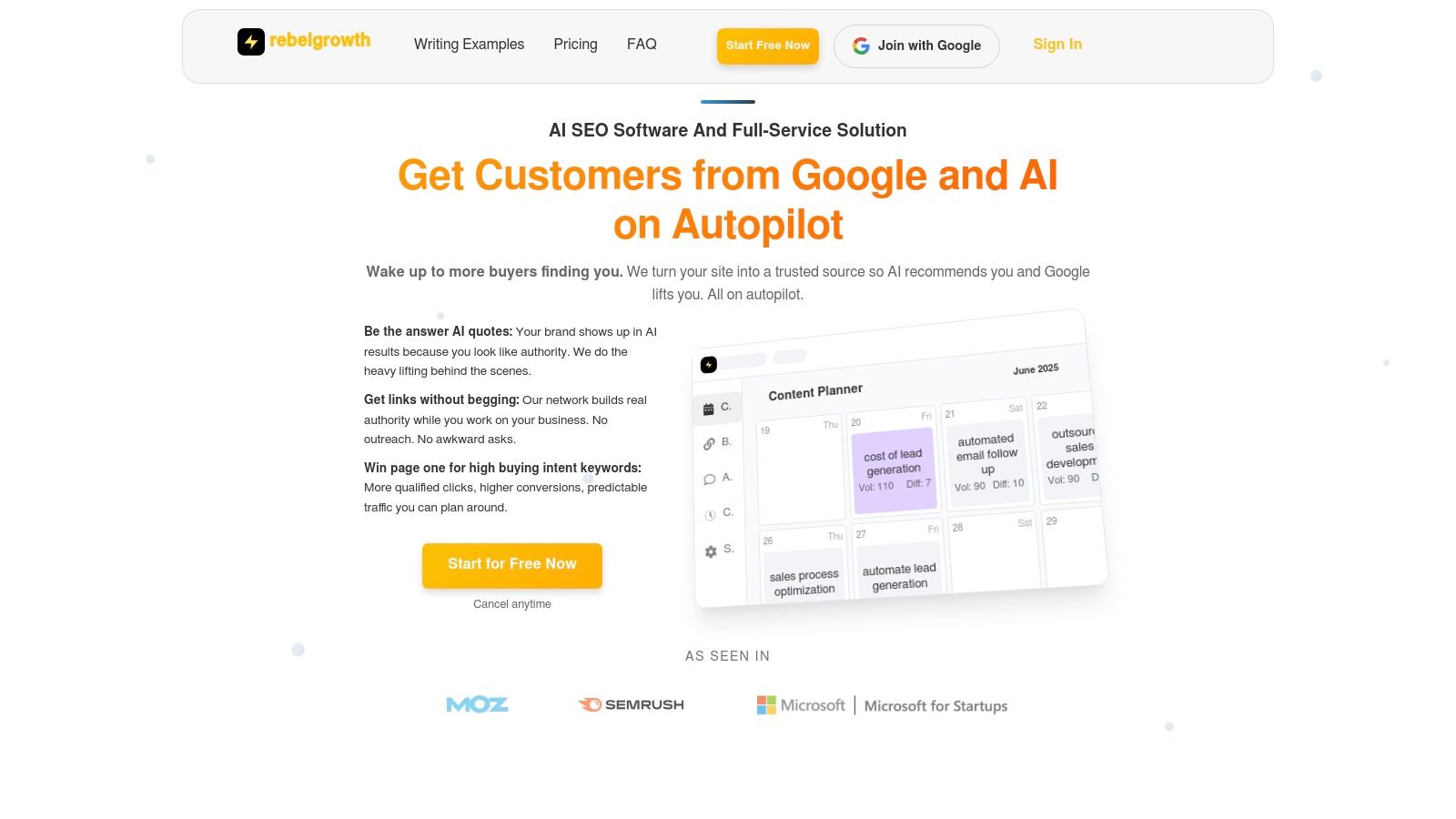
Key Features and Use Cases
- AI Marketing Agent: Tell the AI your goals in plain English, and it executes tasks like keyword research, competitor analysis, and publishing schedules. This makes complex SEO strategies accessible without a steep learning curve.
- Automated Content Engine: Automatically generates up to 30 SEO-optimized articles per month, complete with a rolling content calendar. This is ideal for maintaining publishing velocity and consistently targeting new keywords.
- Built-in Backlink Exchange: An optional but potent feature that facilitates contextual, high-DR backlink placements. This helps improve your site's Domain Rating and increases its chances of being cited by AI search engines, removing the need for manual outreach.
Pricing and Getting Started
Rebelgrowth offers a notably accessible entry point. You can test the platform with a 3-day free trial, followed by a limited-time offer of $9 for the first month. The standard Pro plan is $97/month, which includes the full suite of features: 30 articles, auto-publishing, AI-generated images, and access to the backlink exchange.
Practical Tip: Use the initial trial and low-cost first month to connect your Google Search Console. This allows the AI to analyze your existing performance data and identify high-impact content gaps for immediate targeting.
Pros: * True end-to-end SEO automation from keyword to publication. * Integrated backlink network helps build domain authority without manual outreach. * Extremely low-risk pricing model to validate its fit for your business.
Cons: * As with any automated backlink network, you must monitor link quality and relevance. * Requires human oversight to ensure content aligns perfectly with brand voice, especially for nuanced or highly technical topics.
Website: rebelgrowth.com
2. HubSpot – Marketing Hub
HubSpot Marketing Hub is an all-in-one marketing automation platform built around a powerful, free CRM. This tight integration makes it an excellent choice for small businesses planning for growth, as customer data seamlessly informs every marketing action, from email campaigns to lead nurturing sequences. It stands out by offering a robust free tier that allows businesses to start without an initial investment.
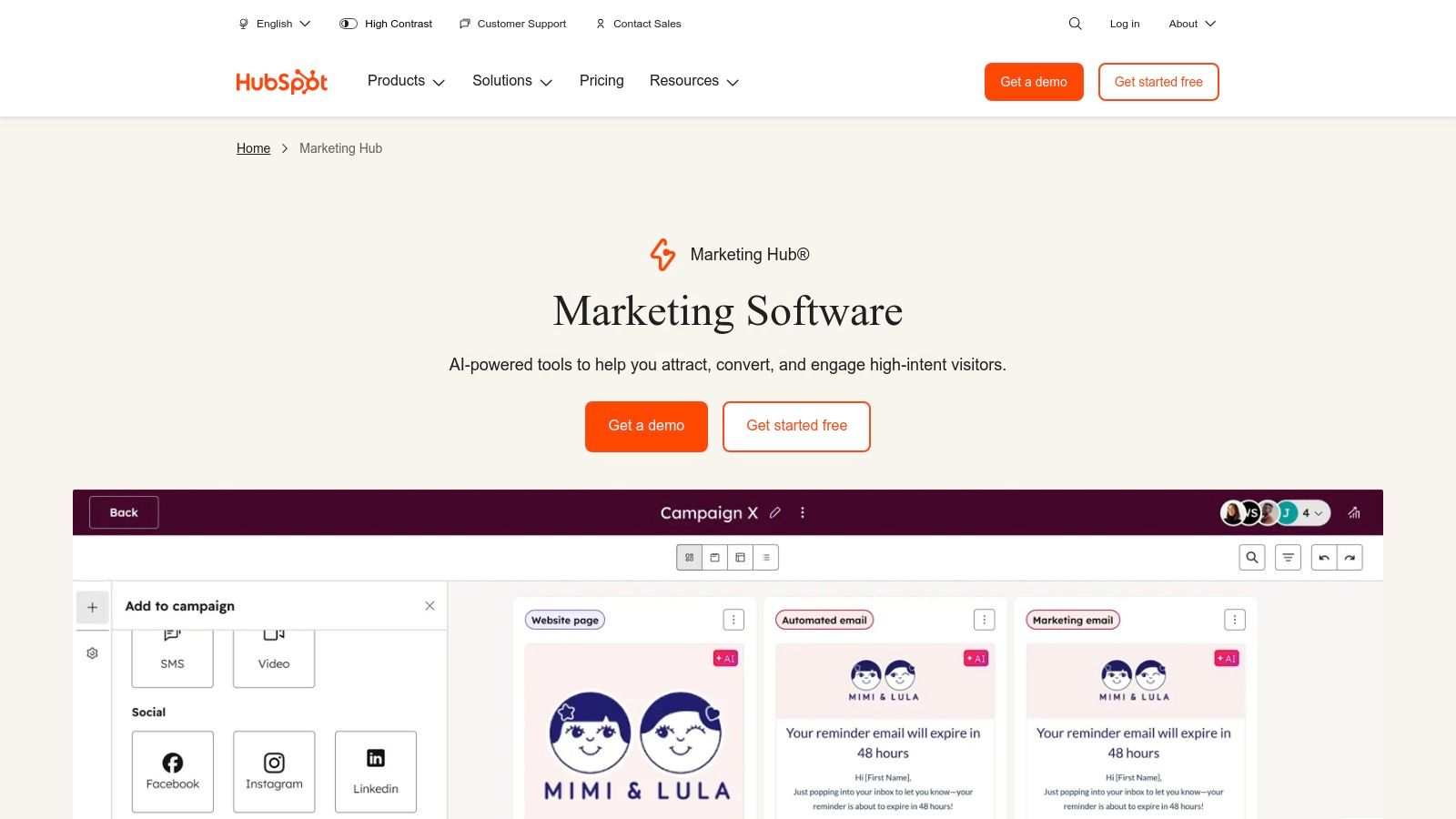
The platform’s visual workflow builder simplifies the creation of complex automation rules, making it accessible even for non-technical users. For those wanting to dive deeper into its capabilities, exploring HubSpot's broader marketing strategies can provide valuable insights. The user experience is clean and backed by extensive support resources.
Key Features & Considerations
- Pros: The free starter tools are genuinely useful, the CRM and marketing data are perfectly linked, and a massive app ecosystem allows for extensive customization.
- Cons: Higher-tier plans (Professional/Enterprise) come with mandatory, costly onboarding fees. Pricing is based on "marketing contacts," which can become expensive without careful list management.
- Best For: Businesses seeking a scalable, CRM-centric platform that can grow with them from basic email marketing to advanced, multi-channel automation.
Website: hubspot.com/products/marketing
You can find more advanced tips for using HubSpot in our Rebel Growth blog.
3. Mailchimp (by Intuit)
Mailchimp has long been a go-to platform for small businesses diving into email marketing, and its evolution into a broader marketing automation tool makes it a strong contender. Known for its user-friendly interface and approachable design, it excels at helping entrepreneurs create professional-looking email campaigns and set up basic customer journeys without a steep learning curve. Its strength lies in simplifying concepts like audience segmentation and automated welcome series.
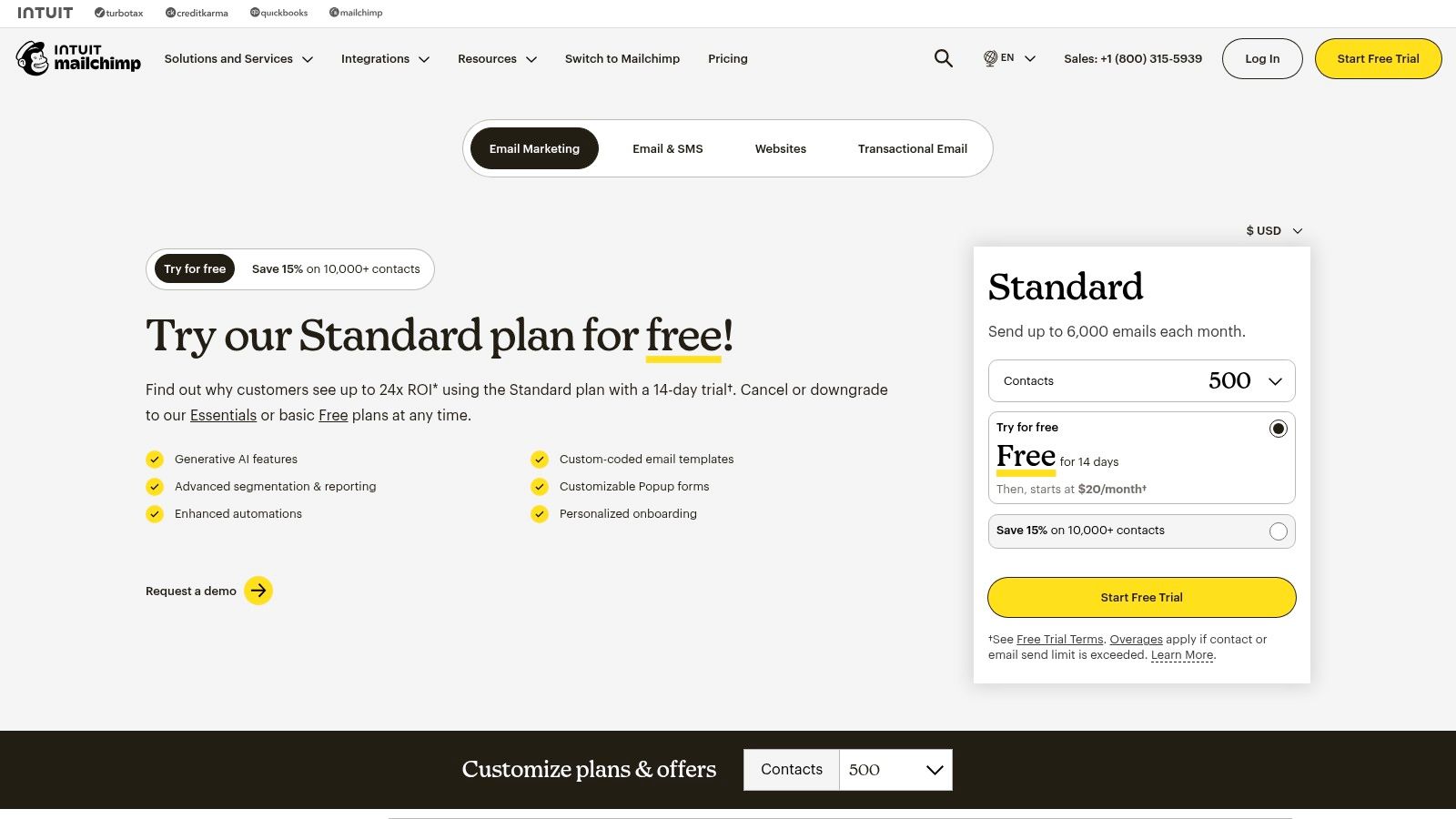
The platform provides an excellent starting point with pre-built journey templates and a drag-and-drop email builder that streamlines campaign creation. While its core focus is email, add-ons like SMS marketing and a vast catalog of integrations with e-commerce platforms like Shopify make it a versatile hub for customer communication. This combination of ease-of-use and expandability solidifies its place among the top marketing automation tools for small business.
Key Features & Considerations
- Pros: The user interface and template library are exceptionally approachable for beginners. It has deep integration capabilities with hundreds of apps and strong brand recognition.
- Cons: The free plan is quite restrictive on contact and send limits. Accessing advanced automation and testing features requires upgrading to more expensive paid plans, which scale in price with your contact list.
- Best For: Small businesses and solo entrepreneurs who are primarily focused on email and need an easy-to-use platform to start building automated customer journeys.
Website: mailchimp.com/pricing/marketing/
To enhance your marketing efforts, grab our free AI SEO checklist and see how to drive more organic traffic.
4. ActiveCampaign
ActiveCampaign is a mature platform that combines advanced marketing automation with a built-in CRM, making it a powerful choice for small businesses ready to implement sophisticated customer journeys. It excels with its highly flexible and intuitive visual automation builder, which allows for complex workflows based on a wide array of triggers like email opens, site visits, and specific events. This balance of power and accessibility makes it one of the top marketing automation tools for small business owners who need granular control without a steep learning curve.
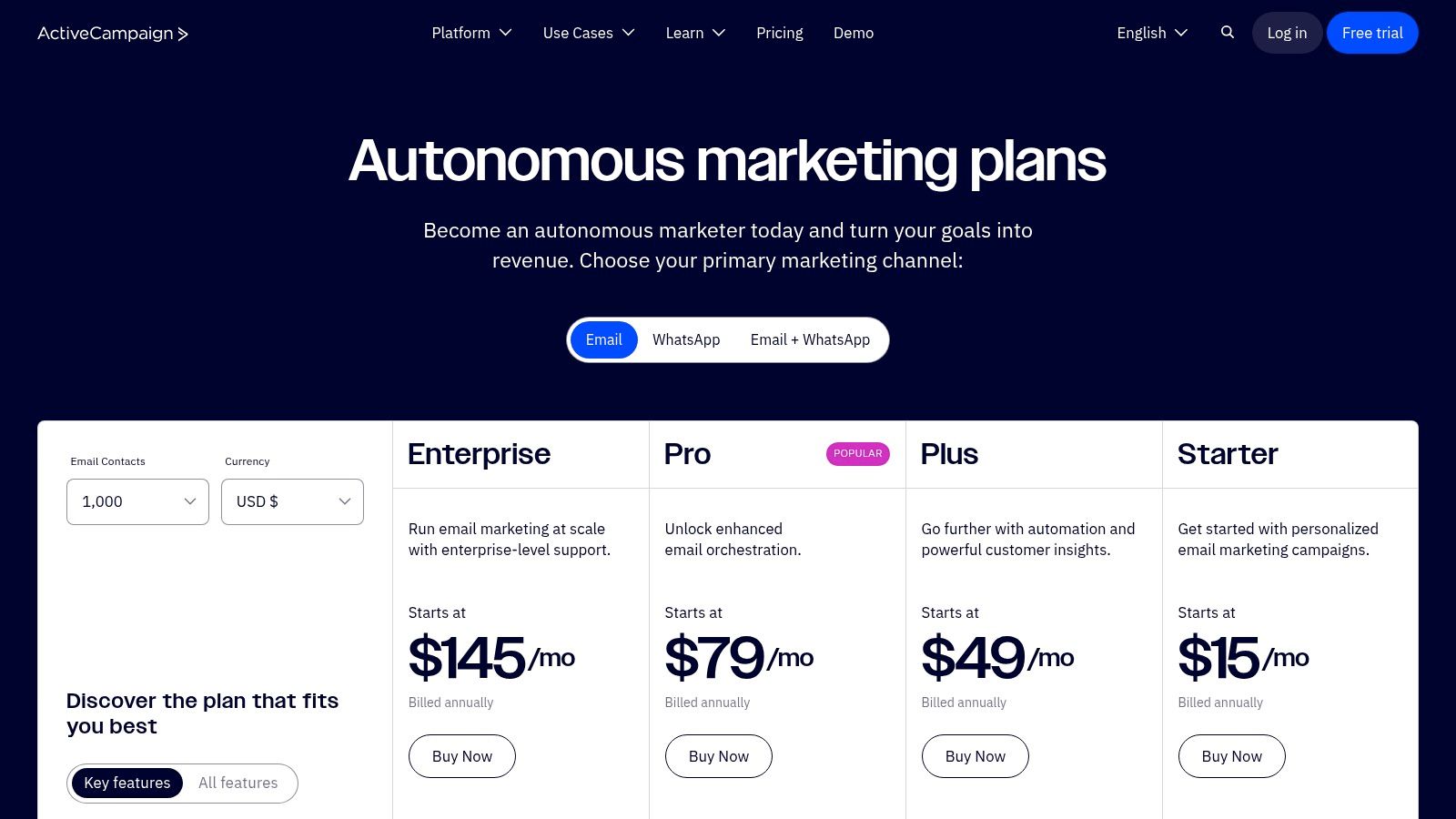
The platform supports multi-channel communication, including email and SMS, within the same automation flow. With over 900 integrations, it connects seamlessly to other tools in your stack. ActiveCampaign offers flexible month-to-month billing and a 14-day free trial, allowing businesses to test its full capabilities without a long-term commitment or expensive onboarding fees.
Key Features & Considerations
- Pros: Its automations are exceptionally powerful for the price point, offering conditional logic and split-testing capabilities. It also offers flexible billing with no required onboarding.
- Cons: The pricing structure, which is based on contact count and feature tiers, can become complex. The deep feature set may require a significant time investment to master fully.
- Best For: Small to mid-sized businesses that want to build sophisticated, logic-based automation sequences to nurture leads and manage customer relationships across multiple channels.
Website: activecampaign.com/pricing
5. Brevo (formerly Sendinblue)
Brevo positions itself as a powerful, budget-friendly suite of marketing tools, extending far beyond traditional email marketing. It’s an ideal choice for small businesses that need to engage customers across multiple channels without breaking the bank. The platform’s strength lies in its inclusive feature set, combining email, SMS, WhatsApp, and push notifications into a single, cohesive automation workflow builder.
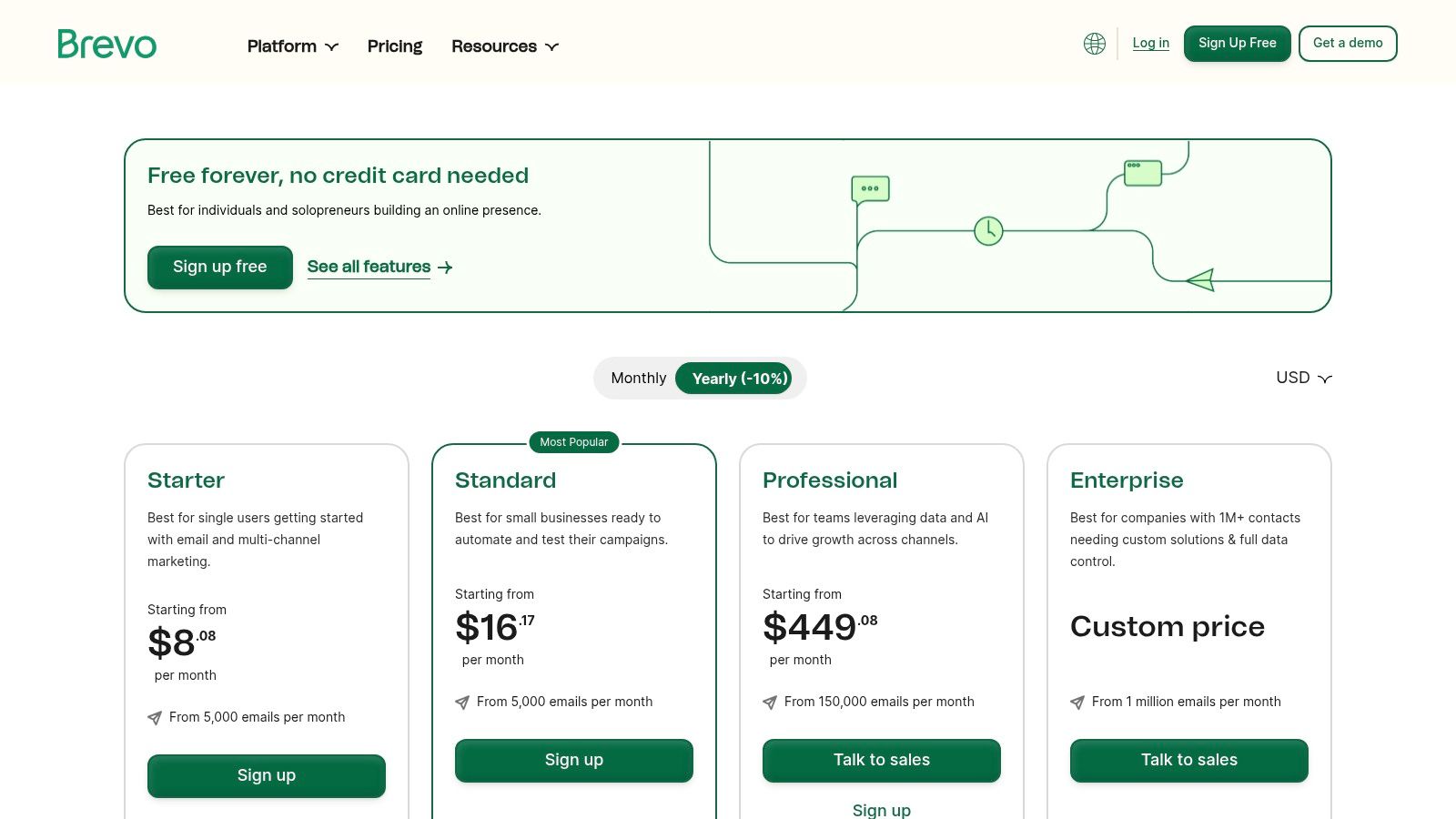
This multi-channel approach allows businesses to create richer, more responsive customer journeys right from the start. Brevo’s pricing model, which is based on send volume rather than contact list size, offers flexibility and cost control, making it one of the most accessible marketing automation tools for small business owners focused on managing expenses while scaling their outreach efforts.
Key Features & Considerations
- Pros: Competitive entry-level pricing with a generous free plan, an excellent mix of communication channels including SMS and WhatsApp, and a flexible pricing model based on email volume.
- Cons: The user interface can feel dense and may require a learning period to master fully. Some of the more advanced automation features and detailed reporting are reserved for higher-tier plans.
- Best For: Small to medium-sized businesses needing an all-in-one, multi-channel marketing platform that offers predictable costs and scales effectively with growing communication needs.
Website: www.brevo.com
6. Keap (Infusionsoft)
Keap, formerly known as Infusionsoft, is an all-in-one CRM designed specifically for service-based small businesses. It consolidates sales and marketing automation with operational tools like appointments, invoicing, and payments into a single platform. This integrated approach makes it one of the most practical marketing automation tools for small business owners who want to manage their entire client lifecycle without juggling multiple software subscriptions.
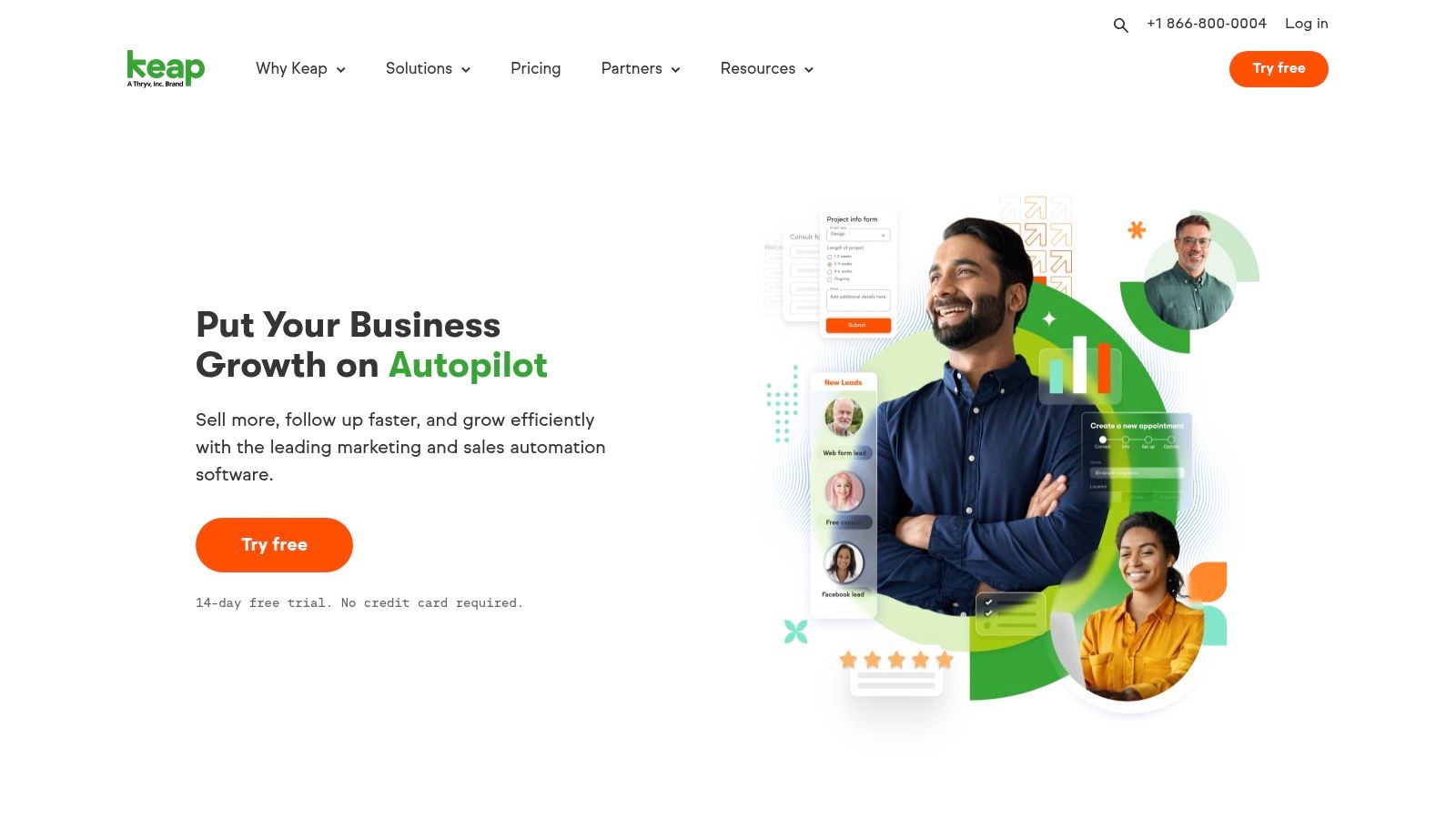
The platform features a powerful visual automation builder for creating sophisticated follow-up campaigns that combine both email and SMS. By centralizing sales pipelines and payment processing, Keap allows businesses to trigger automation based on quotes accepted or invoices paid, streamlining operations from lead capture to final payment. This focus on connecting marketing with business operations is its key differentiator.
Key Features & Considerations
- Pros: The unified toolset reduces software clutter and data silos, and a variety of hands-on onboarding options and professional services are available to ensure successful implementation.
- Cons: Entry pricing is higher than pure email marketing tools, there is no permanent free plan, and costs scale directly with the number of contacts and users.
- Best For: Service-based entrepreneurs and small businesses that need a combined CRM, sales pipeline, and marketing automation system with built-in invoicing and payment capabilities.
Website: keap.com
7. Zoho Marketing Automation
Zoho Marketing Automation is a powerful, multichannel platform designed to fit seamlessly within the wider Zoho ecosystem. Its greatest strength lies in this native integration, making it a compelling choice for small businesses already utilizing Zoho CRM or the Zoho One suite. This connection allows for a unified customer view, where sales and marketing data work together to create highly personalized customer journeys.
The platform offers a comprehensive suite of tools, from a visual journey builder to lead scoring and multi-channel campaigns across email, SMS, and social media. Website behavior tracking and goal setting are also included, providing a complete picture of the customer lifecycle. While it offers deep functionality, the user interface will feel most intuitive to those familiar with other Zoho products.
Key Features & Considerations
- Pros: The pricing is very competitive for the extensive feature set offered. It provides a smooth, integrated experience for businesses already invested in the Zoho app ecosystem.
- Cons: New users may face a notable learning curve, especially if they are unfamiliar with Zoho’s design philosophy. Pricing is tiered by contact count and billing frequency, so it's crucial to verify the final cost before committing.
- Best For: Small to mid-sized businesses that already use or plan to adopt the Zoho suite, seeking a cost-effective yet feature-rich marketing automation tool.
Website: zoho.com/marketingautomation
8. Klaviyo
Klaviyo is a powerful e-commerce-focused marketing automation tool built specifically for online retailers. Its core strength lies in its deep integration with platforms like Shopify and WooCommerce, allowing it to leverage a rich data model based on customer behavior, such as purchase history and browsing activity. This makes it exceptional for creating highly personalized lifecycle marketing campaigns, from abandoned cart reminders to customer winback flows.
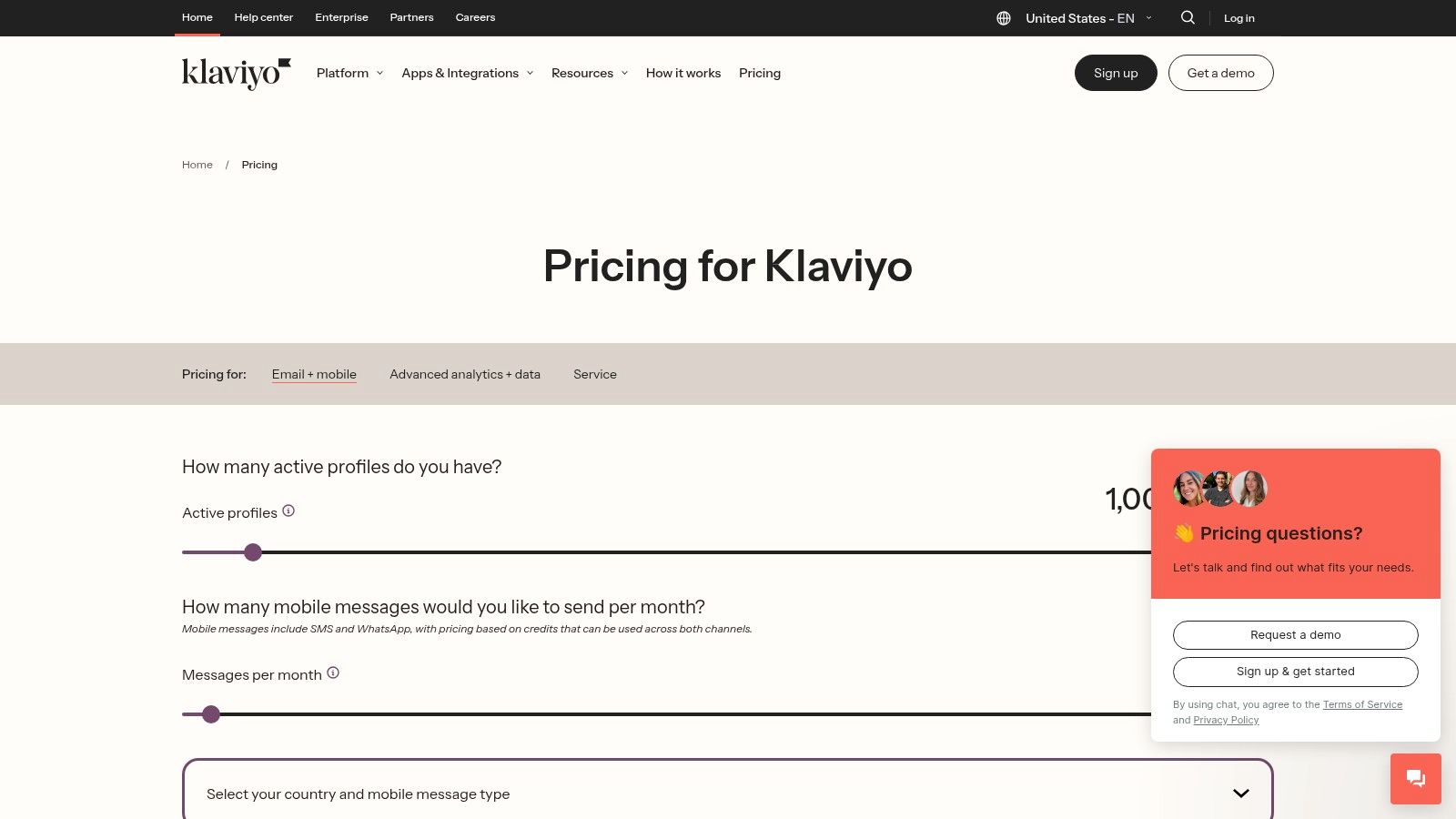
The platform combines email, SMS, and now WhatsApp messaging under one roof, giving businesses a multi-channel approach to customer communication. With over 350 integrations and robust analytics, it provides the data-driven insights needed to optimize campaigns and increase customer lifetime value. While it offers a free tier for businesses just starting out, its true power is unlocked in its paid plans.
Key Features & Considerations
- Pros: Its e-commerce data model is unparalleled for personalization, offering advanced segmentation based on catalog and purchase data. The platform has a clear free tier to get started and scales logically.
- Cons: Pricing, based on both profile count and messaging credits, can escalate quickly for growing stores. Its feature set may be overly specialized and complex for non-e-commerce businesses.
- Best For: E-commerce businesses, particularly those on Shopify or WooCommerce, that want to implement sophisticated, data-driven automation for abandoned carts, product recommendations, and customer loyalty.
Website: klaviyo.com/pricing
9. GetResponse
GetResponse positions itself as an all-in-one online marketing platform that extends well beyond typical email automation. It’s a strong contender for small businesses that want to consolidate their toolset, as it integrates features like webinar hosting, conversion funnels, and landing pages directly into its marketing automation tools for small business. This makes it possible to build and manage an entire customer journey within a single ecosystem.
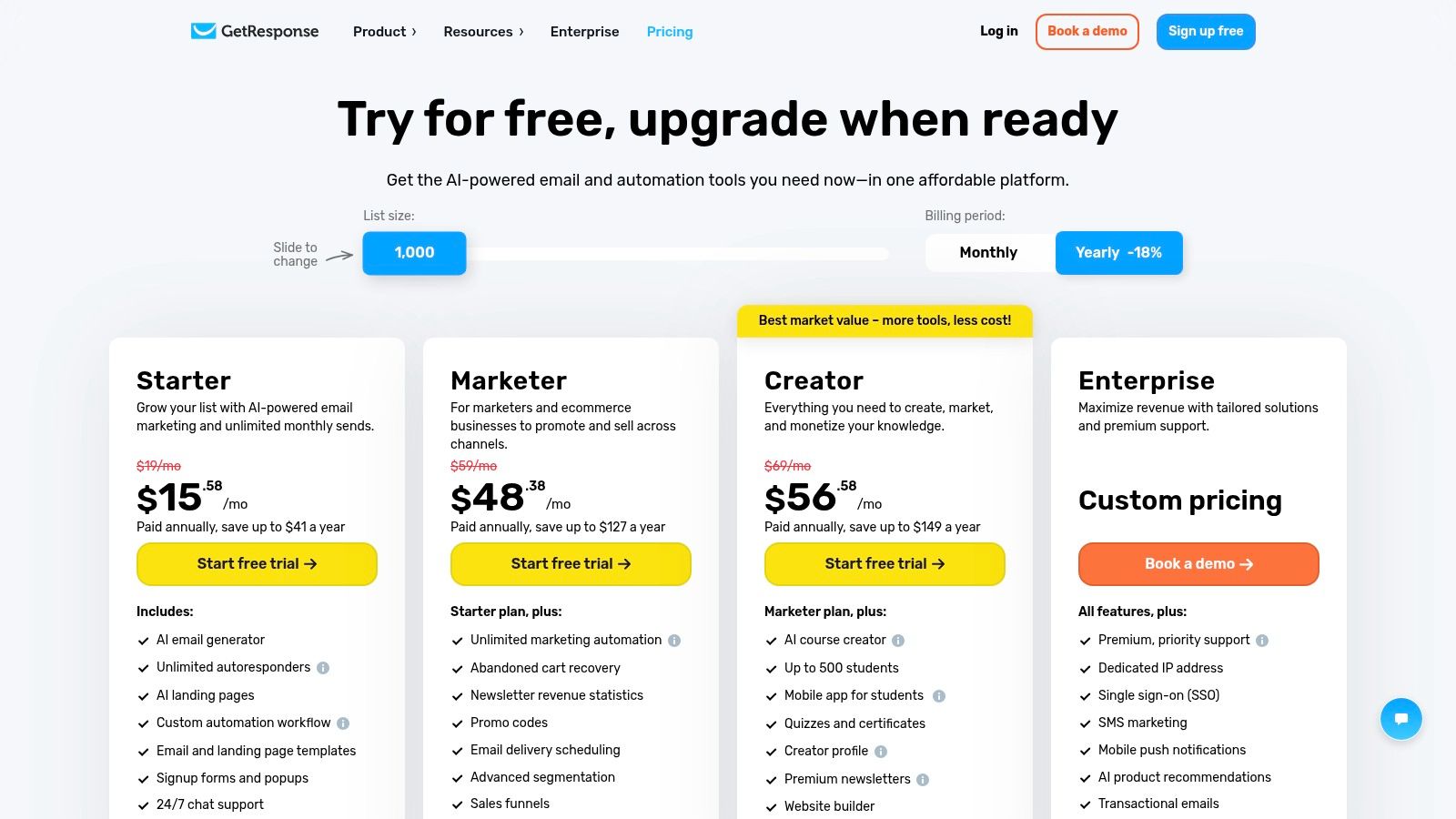
The platform is designed to be accessible, offering email automation, autoresponders, and AI-powered helpers even on lower-tier plans. With 24/7 live chat support, users can get help quickly. Its comprehensive approach allows businesses to create sophisticated campaigns, from lead magnet delivery via popups to full-scale webinar promotions, without needing to integrate multiple third-party applications.
Key Features & Considerations
- Pros: Its broad, built-in toolset can replace several separate subscriptions, and many plans offer unlimited monthly email sends.
- Cons: Feature availability can differ by region and plan, so verify access for your specific needs. Pricing increases with both list size and feature tiers, which can add up.
- Best For: Small businesses looking for a single platform to manage email, host webinars, and build automated sales funnels without relying on extensive integrations.
Website: https://www.getresponse.com/pricing
10. Constant Contact
Constant Contact is a veteran in the email marketing space, known for its approachable interface and strong focus on user support. It serves as an excellent entry point into marketing automation tools for small businesses, especially those without a dedicated marketer. The platform simplifies core tasks like building email lists, creating professional campaigns with templates, and setting up basic automated welcome sequences.
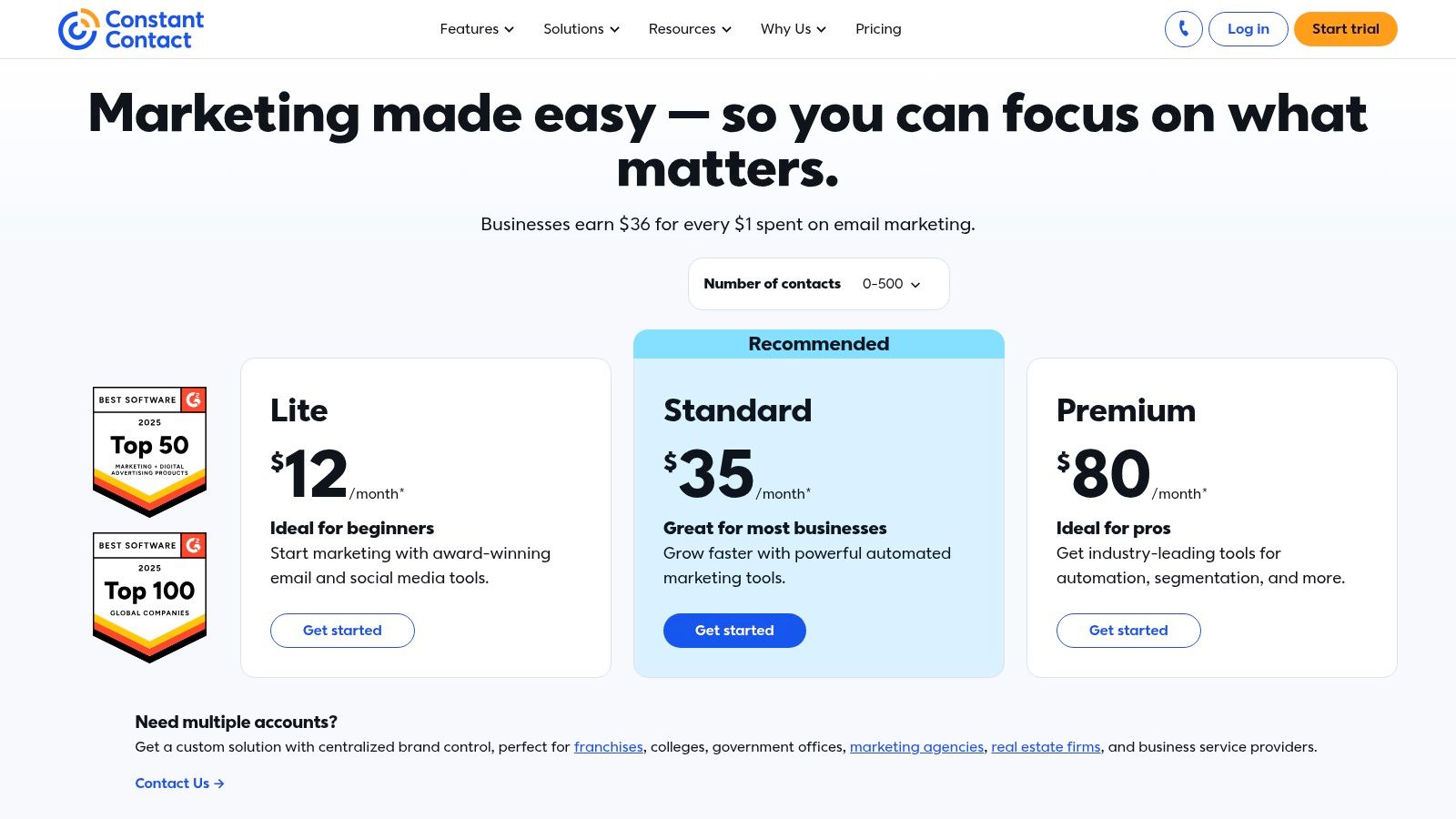
While its automation capabilities are not as deep as some competitors, it shines in its user-friendliness and integrated tools for event marketing, social posting, and running ads. This makes it a practical, all-in-one solution for business owners who value simplicity and guided support over complex, multi-step workflow builders. The platform’s helpful onboarding process ensures even first-time users can launch effective campaigns quickly.
Key Features & Considerations
- Pros: Extremely approachable for beginners and non-marketers, with robust, hands-on customer support and helpful onboarding. The email editor and templates are very easy to use.
- Cons: Automation features are less advanced compared to more specialized platforms, lacking complex conditional logic. Pricing is tied directly to the number of contacts, which can become costly as a list grows.
- Best For: Small businesses, non-profits, and solo entrepreneurs who need a straightforward, reliable tool for email marketing, contact management, and event promotion without a steep learning curve.
Website: https://www.constantcontact.com/pricing
11. Shopify – Built-in Marketing Automations (and App Store)
For e-commerce businesses running on Shopify, the most seamless starting point for automation is the platform's own native toolset. Built directly into the Shopify ecosystem, it allows merchants to launch essential campaigns like abandoned checkout reminders, customer winback series, and welcome emails with minimal friction. This tight integration ensures all automations are fueled by real-time customer and order data, making it one of the most cohesive marketing automation tools for small business owners in e-commerce.
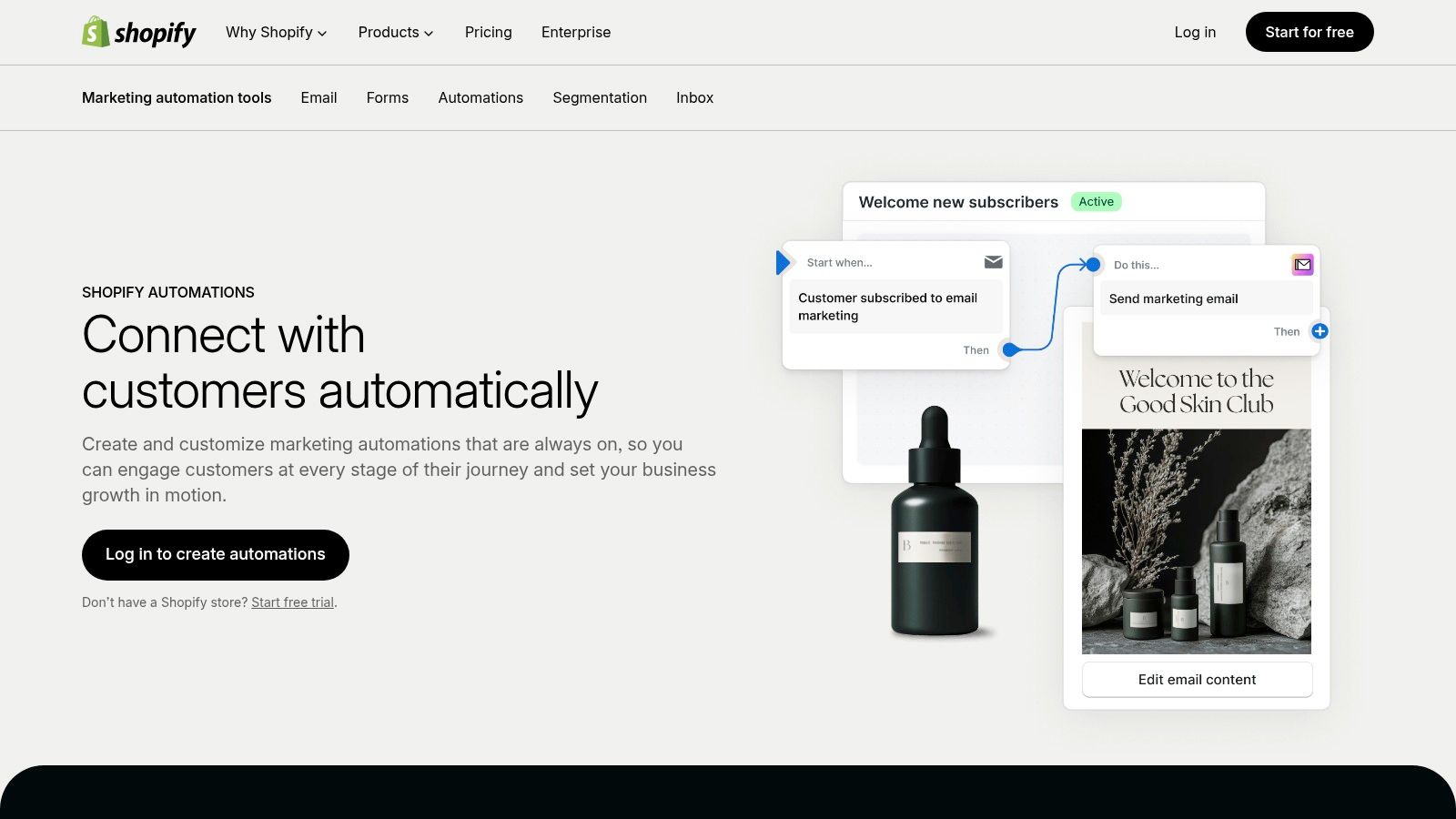
The platform utilizes a simple trigger-condition-action workflow builder with pre-built templates, making it incredibly accessible for those new to automation. While native tools cover email, merchants can easily extend their reach into SMS, push notifications, and more complex sequences through the extensive Shopify App Store. This blended approach provides a solid foundation that can be expanded as marketing needs evolve.
Key Features & Considerations
- Pros: Zero-friction setup for existing Shopify merchants, customer and sales data are perfectly synced, and it is quick to launch essential campaigns using built-in templates.
- Cons: Full functionality may require access to Shopify Flow or specific plan permissions. Advanced multi-channel automation almost always requires paid third-party apps.
- Best For: Shopify-based e-commerce businesses that want a simple, deeply integrated solution for core marketing automations before investing in more complex, third-party platforms.
Website: shopify.com/marketing-automation
Optimizing the user journey is key, and you can get started by learning how to build effective landing pages for your campaigns.
12. G2 – Marketing Automation Software Category
While not a tool itself, G2’s Marketing Automation category is an indispensable research hub for any small business vetting software. It functions as a massive, user-driven directory where you can compare dozens of marketing automation tools for small business based on verified reviews, feature sets, and market presence. This allows you to shortlist potential vendors and gain insights from peers who have direct experience with the platforms.
The platform’s strength lies in its filterable product listings and side-by-side comparison grids, which help cut through marketing jargon. You can easily see how different solutions stack up in areas like lead nurturing, email marketing, or analytics. G2’s "Best Of" reports and user-generated ratings provide a layer of social proof that vendor websites cannot, helping you make a more informed decision before committing to a free trial or purchase.
Key Features & Considerations
- Pros: Saves significant time by allowing side-by-side vetting of multiple platforms. Provides authentic, real-world feedback from a large base of small and mid-sized business users.
- Cons: Some product listings may contain vendor-provided marketing language, so always cross-reference with the official site. Pricing information on G2 can sometimes lag behind vendor updates.
- Best For: Businesses in the initial research phase looking to create a shortlist of relevant tools based on unbiased user reviews and detailed feature comparisons.
Website: g2.com/categories/marketing-automation
Top 12 Marketing Automation Tools for Small Business — Comparison
| Product | Core Features | Quality ★ | Value 💰 | Audience 👥 | USP ✨ |
|---|---|---|---|---|---|
| 🏆 rebelgrowth | AI SEO agent; 30-article rolling calendar; auto-publish; backlink-exchange; social scheduling | ★★★★★ | 💰 3‑day trial; $9 first month (promo); Pro $97/mo | Entrepreneurs, solo founders, small marketing teams | ✨ Hands‑free end‑to‑end SEO + backlink network; AI marketing agent |
| HubSpot – Marketing Hub | CRM‑linked automations; emails, landing pages, visual workflows | ★★★★☆ | 💰 Free tier; scales with contacts; onboarding on higher tiers | SMBs scaling to enterprise; teams needing CRM sync | ✨ Tight CRM→marketing data loop; large ecosystem |
| Mailchimp (Intuit) | Email builder; prebuilt journeys; A/B testing; audience mgmt | ★★★★☆ | 💰 Free plan (limited); paid plans scale by contacts | Small businesses starting email marketing | ✨ Very approachable UI & templates |
| ActiveCampaign | Visual automations with conditional logic; email/SMS; CRM on higher plans | ★★★★☆ | 💰 14‑day trial; pricing by contacts | SMBs needing advanced automations without mandatory onboarding | ✨ Powerful automations for the price |
| Brevo (Sendinblue) | Email, SMS, WhatsApp, web push; automation; A/B testing | ★★★☆☆ | 💰 Competitive entry pricing; send‑volume tiers | Growing SMBs needing multichannel messaging | ✨ WhatsApp & push support at accessible price |
| Keap (Infusionsoft) | CRM + marketing automation; appointments, invoicing, payments | ★★★☆☆ | 💰 No free plan; higher entry pricing; onboarding options | Service businesses wanting CRM + ops consolidation | ✨ Integrated payments & appointments |
| Zoho Marketing Automation | Journey builder, scoring; email/SMS/WhatsApp; website tracking | ★★★★☆ | 💰 Competitive pricing (best with Zoho apps) | SMBs in Zoho ecosystem or cost‑sensitive buyers | ✨ Deep Zoho suite integrations |
| Klaviyo | Advanced segmentation; email + SMS; ecommerce triggers & analytics | ★★★★☆ | 💰 Free tier for small profiles; costs scale with profiles/credits | Ecommerce brands (Shopify, WooCommerce) | ✨ Superior ecommerce data model & personalization |
| GetResponse | Email automation; funnels; landing pages; webinars; web push | ★★★☆☆ | 💰 All‑in‑one tiers; pricing by list size | SMBs wanting funnels + webinar tools | ✨ Built‑in webinar + funnel capabilities |
| Constant Contact | Email templates; basic automation; event marketing; social tools | ★★★☆☆ | 💰 Approachable pricing; scales with contacts | First‑time marketers, small organizations | ✨ Easy UI with hands‑on support |
| Shopify – Built‑in Automations | Store‑tied workflows; templates; segmentation by orders/products; app extensibility | ★★★★☆ | 💰 Included for merchants; advanced features may need paid apps | Shopify merchants & ecommerce teams | ✨ Zero‑friction store data & quick templates |
| G2 – Marketing Automation Category | Filterable listings; verified reviews; side‑by‑side comparisons | ★★★★☆ | 💰 Free to use; saves vetting time | Buyers researching and shortlisting vendors | ✨ Verified user reviews + “Best Of” market reports |
Choosing the Right Automation Tool to Fuel Your Growth
Navigating the landscape of marketing automation tools for small business can feel overwhelming, but making an informed choice is the first step toward reclaiming your time and scaling your operations. We've explored a range of platforms, from all-in-one powerhouses like HubSpot and ActiveCampaign to e-commerce specialists like Klaviyo and the built-in features of Shopify. Each tool offers a unique blend of features, pricing, and complexity, underscoring a critical takeaway: there is no single "best" platform, only the one that is best for your business.
The right tool is the one that aligns with your specific goals, integrates with your existing tech stack, and fits comfortably within your budget. Don't be swayed by an endless list of features you may never use. Instead, focus on the core functionalities that will solve your most pressing challenges today, whether that's lead nurturing, customer segmentation, or abandoned cart recovery.
Your Action Plan for Selecting a Platform
Before you commit, it’s essential to map out a clear path forward. A strategic approach will prevent you from investing in a tool that becomes more of a burden than a benefit.
Here are the crucial steps to take:
- Define Your Core Needs: What specific tasks do you want to automate? Start with your top three priorities. Is it email sequences, social media scheduling, or lead scoring? This clarity will immediately narrow down your options.
- Audit Your Current Toolkit: List the software you already use (e.g., your CRM, e-commerce platform, landing page builder). Check the integration capabilities of your top contenders to ensure a seamless workflow. Platforms like Zoho and Keap excel at creating a connected ecosystem.
- Utilize Free Trials: Almost every tool on our list offers a free trial or a limited free plan. Use this opportunity to test the user interface, build a simple automation, and assess the quality of their customer support. This hands-on experience is invaluable.
- Plan for Implementation: Choosing a tool is only half the battle. You need a plan for setting it up, migrating contacts, and training your team. To ensure your efforts deliver maximum impact and return on investment, delve into these valuable marketing automation best practice tips.
Final Thoughts on Fueling Your Growth
Ultimately, marketing automation is about more than just software; it's a strategy for building stronger, more personalized relationships with your customers at scale. By automating repetitive tasks, you free up your most valuable resource: your time. This allows you to focus on the creative, strategic, and human elements of your business that truly drive growth.
Start small, master the fundamentals, and choose a tool that can grow with you. The right platform will become a powerful engine for your marketing, working tirelessly behind the scenes to attract, engage, and delight your audience, paving the way for sustainable success.
Feeling overwhelmed by the options and need a solution built specifically for service-based businesses and consultants? rebelgrowth combines powerful CRM and marketing automation features into one simple platform, designed to help you generate leads and close deals without the complexity. Discover how rebelgrowth can streamline your entire sales and marketing process.
